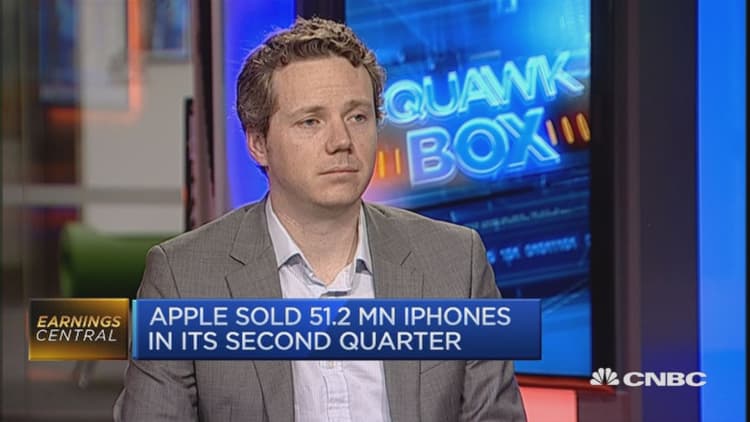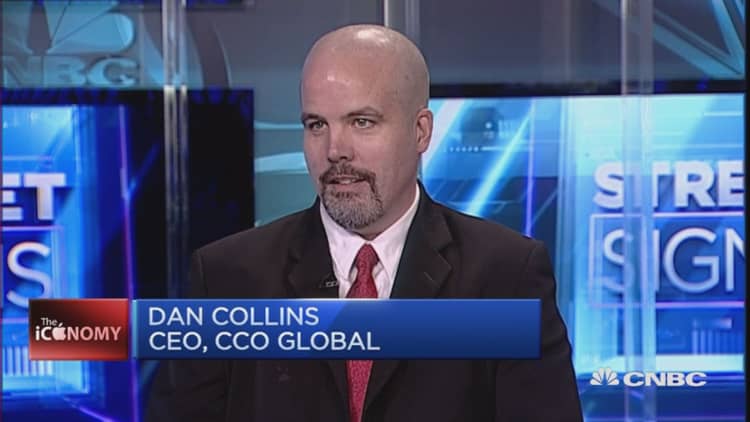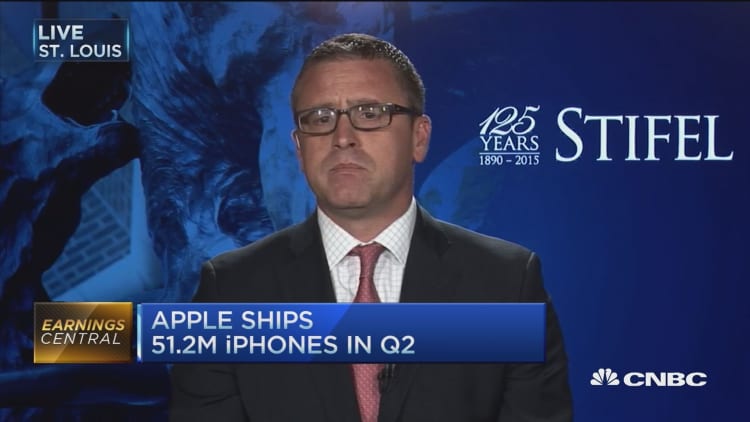



Investors may have been focused on the decline in iPhone shipments when Apple reported its latest quarterly results on Tuesday, but there was one bright spot which could be a key driver of growth for the U.S. technology giant: Services.
This section in Apple's earnings includes products like Apple Pay, Apple Music, iTunes and the App Store and is now the second biggest segment in terms of revenues, outstripping both iPad and Macs.
Revenue from services came in at $5.99 billion in the fiscal second quarter — topping analyst estimates of $5.78 billion, according to StreetAccount. This was a 20 percent rise from the same period last year, highlighting the focus Apple has been putting on the segment.
As the overall smartphone market matures and users wait for a new iPhone model, focusing on services that give recurring revenues will be crucial for Apple, analysts said, especially since the company has an customer base of 1 billion across all its devices.
"Focusing on services is the best strategy and the increase is quite remarkable. They are starting to fully explore the 1 billion users in its customer base and it is one of the best customer bases a company can have," Francisco Jeronimo, research director for European mobile devices at IDC, told CNBC in a phone interview.
"If they continue through normal sales of iPhone there is not much they can do in terms of hardware and bringing something new. The next iPhone will be an incremental upgrade, not a revolution. So services are the only way they can keep momentum or revenues."
Jeronimo added that the current 13 million subscriber number for Apple Music, which chief executive Tim Cook announced yesterday, was small in comparison to the over 1 billion install base of Apple devices, so there was big room to grow.
Competition
Apple Music is not the only service the company has on offer. Apple Pay, its mobile payments product, is another part of the puzzle. Cook said on the earnings call that it was "growing at a tremendous rate", adding 1 million new users per week. And Apple has also been focusing on health after launching its Healthkit app in 2014 and the Apple Watch could play a big part in this.
But while Apple's iPhone has managed to gain a strong foothold in the high-end of the smartphone market over the past few years, it faces really stiff competition in many other areas.
"They do have a billion active devices out in the market. But how do they develop that going forward? They have Apple Pay, but Samsung, Visa and MasterCard are all looking at payments, but how does Apple compete with that?," Dan Collins, chief executive of CCO Global, told CNBC by phone.
China challenge
In the music streaming space, Apple has to battle against the likes of Spotify, which has 30 million paying subscribers. And in the payments space, Samsung Pay is a key challenger.
Another weak spot in the earnings was China. Revenues for the greater China region – comprising mainland China, Taiwan and Hong Kong – fell 26 percent year-over-year in the fiscal second quarter. This has been a consistent area of growth for Apple and seen as a big growth driver.
Apple has been attacked by the likes of Huawei, which has made a huge bid for the high-end space in recent times, and the attraction of the high-spec low priced phones produced by Xiaomi. But Cook said he was still "really optimistic about China".
But being able to monetize services in China might be a big challenge as the likes of Google has found out. In the music space, the likes of Alibaba and Baidu have their own services in China, while in payments JD.com, Alibaba and Tencent already dominate the market. Many of these services are ingrained into Chinese consumers' usage habits and linked to a number of different services. For example, Alibaba's Alipay is used on their e-commerce platforms as well as other websites.
Being able to muscle into this market could be a struggle for Apple.
"A concerted effort to push Apple services to existing iPhone users could help drive a new revenue stream, however history has show that it is extremely difficult for non-Chinese companies to adopt this strategy. This has prevented companies such as Google to target the Chinese market and allowed local players such as Alibaba and Tencent to dominate the opportunity to date," Ben Wood, chief of research at CCS Insight, told CNBC by email.


